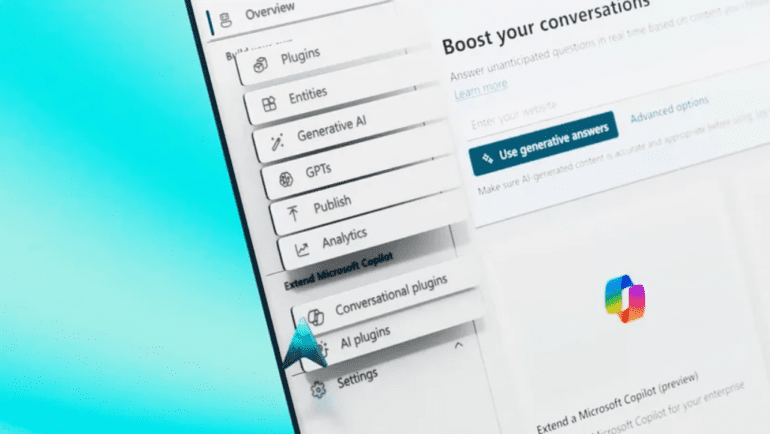TL;DR:
- Microsoft introduced Copilot Studio, a no-code solution for creating custom AI copilots and integrating ChatGPT AI chatbots.
- It extends Microsoft 365 Copilot, allowing businesses to personalize their copilot experiences with custom datasets and automation flows.
- IT admins can use natural language or a graphical interface to link data sources from partners like SAP and Workday.
- Copilot Studio simplifies the design of conversational frameworks, making it versatile for various applications.
- It offers monitoring capabilities for copilot usage and analytics, along with control over custom copilot creation.
- Copilot Studio also serves as an integration hub for OpenAI’s GPT platform.
Main AI News:
In the dynamic realm of AI innovation, Microsoft is unveiling Copilot Studio, a game-changing no-code solution that empowers businesses to craft their very own AI copilots or seamlessly integrate bespoke ChatGPT AI chatbots. This strategic move from Microsoft comes hot on the heels of OpenAI’s recent announcement about its revolutionary GPT platform, which democratizes the creation of personalized AI models.
The core objective of Microsoft Copilot Studio is to amplify the capabilities of Microsoft 365 Copilot, the premium service introduced by Microsoft just a few weeks ago. Now, enterprises can wield the power to tailor their Microsoft 365 Copilot experience by incorporating custom datasets, automation workflows, and even unique copilots not tethered to the Microsoft Graph, the bedrock of Microsoft 365 Copilot.
Jared Spataro, the luminary behind this groundbreaking venture and head of modern work and business applications at Microsoft, articulates the profound simplicity that Copilot Studio brings to the table. “With Copilot Studio, building AI assistants and seamlessly integrating them with your pivotal business systems is as effortless as engaging in a conversation,” he asserts. IT administrators can harness the potential of natural language or opt for a user-friendly graphical interface within Microsoft Copilot Studio to forge connections with novel data sources, including esteemed partners like SAP, Workday, ServiceNow, and many more. This innovative platform also empowers users to create and deploy custom copilots tailored to their unique business needs.
Spataro goes on to highlight Copilot Studio’s user-friendly approach. “Now, you can articulate your desires in natural language, and Copilot Studio will guide you through the process of designing and refining the conversational framework,” he elucidates. This spans a diverse spectrum of possibilities, ranging from deploying a copilot on a website to assist with customer queries to embedding a copilot within a quarterly earnings release.
Beyond its creation capabilities, Copilot Studio also serves as a powerful tool for IT administrators to closely monitor copilot usage and glean insights from analytics. Administrators retain the authority to determine who has the privilege of building custom copilots. Furthermore, it functions as a centralized hub for seamlessly integrating custom ChatGPT chatbots crafted using OpenAI’s pioneering GPT platform. Spataro underscores the strategic partnership between OpenAI and Microsoft, emphasizing their commitment to enabling seamless integration of OpenAI’s services within Microsoft’s ecosystem. “Following the latest announcements from OpenAI’s first DevDay,” Spataro affirms, “we remain steadfast in our dedication to supporting GPTs, ensuring that creators can harness this transformative technology within Copilot Studio.”
Microsoft’s Copilot Studio announcement marks a pivotal milestone in the broader AI initiative for Copilot. The future promises a slew of new features designed to empower businesses, a rebranding of Bing Chat, and the introduction of custom CPU and AI chips to supercharge this revolutionary venture.
Conclusion:
Microsoft’s Copilot Studio launch signifies a major stride in the AI market, offering businesses the ability to easily tailor AI copilots to their specific needs. With seamless integration of data sources and simplified conversation design, this platform empowers organizations to enhance their customer interactions and streamline internal processes. It also underscores the strategic partnership between Microsoft and OpenAI, promising continued innovation in the AI landscape.

